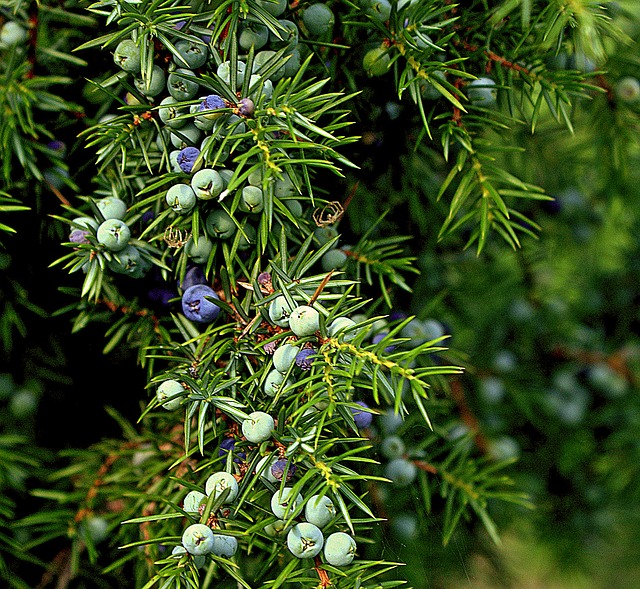Juniper Berry

Also known as Juniperus communis, and Common Juniper.
Introduction The juniper is an evergreen tree native to Europe, Asia, and the northern parts of North America and it is especially abundant in central Texas and Eastern Oregon. The history and folklore concerning the juniper tree is long reaching. The first recorded mention of use is in an Egyptian papyrus from 1500 B.C.E. that tells of its use in treating tapeworms. Juniper was the symbol of the Canaanites fertility goddess Ashera. The Romans used it for all types of stomach ailments, and noted herbalist Nicholas Culpepper wrote that it was used in a treatment for flatulence. Native Americans of the northeast used it to relieve infection and ease the pain of arthritis. The Hopi boiled the berries and parts of the tree and consumed it to treat stomach disorders. Western European folklore tells that is a juniper tree is planted by the door to your home, a witch cannot enter. Juniper incense has also been used by the Scottish to ward off the evil eye, and by the Tibetans to remove demons. The purple, blue, violet, or blackish-brown fruits are harvested in early autumn for culinary and medicinal use.
Constituents Primarily sugars, but also pinene, limonene, tannins, and antioxidant flavonoids.
Parts Used The berries, whole, ground, or rubbed through a sieve. To prevent loss of essential oil, juniper berries should not be ground, crushed, or rubbed until just before use. The herb is frequently combined with birch leaf, horsetail, parsley "seed," or restharrow in herbal diuretic teas.
Typical Preparations May be taken as a tea, extract or capsule, and may be liberally sprinkled on food or added to drinks and smoothies.
Summary Today, the best known use of juniper berries is the main flavoring agent in Gin. Juniper berries are a mild diuretic that stimulate urination without causing loss of electrolytes. Added to food, juniper berries prevent gas and heartburn. Historically, they have been used to treat bladder and kidney infections.
Precautions If you have been using juniper berry tea for several weeks and you urine smells like violets, you have been using the herb too long. Continued overdose can cause renal irritation and blood in the urine, so only use in moderation. Since juniper berries can stimulate uterine contractions, avoid use during pregnancy. They should not be used by anyone who has inflammation of the kidneys.
PURCHASE JUNIPER BERRY EXTRACT
For educational purposes only. This information has not been evaluated by the Food and Drug Administration.
This information is not intended to diagnose, treat, cure, or prevent any disease.
This information courtesy of MOUNTAIN ROSE HERBS, with full, written permission for reuse.
For further traditional information concerning JUNIPER BERRY, please visit this excellent resource from Botanical.com. Used with full, written permission.






